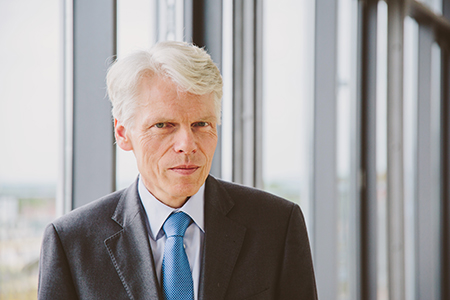University of Freiburg Marks Retirement of Andreas Barneras Chair of University Council
Freiburg, 04/10/2024
Andreas Barner, the longest-ever serving University Council chair, is retiring from his post after nine successful years. Rector Kerstin Krieglstein acknowledges him as an outstanding individual who played a decisive role in shaping and guiding the University’s further development.

The University of Freiburg marked the retirement of Prof. Dr. Dr. Andreas Barner from his post as the longest-ever serving University Council chair on 30 September 2024, after nine years and three terms of office. ‘With his outstanding personality, Andreas Barner has played a decisive and unique role in shaping and guiding the University of Freiburg’s successful development’, says Prof. Dr. Kerstin Krieglstein, Rector of the University of Freiburg. ‘I would like to express my sincere thanks for this, both on behalf of the entire University and in my own name!’
‘During my time on the University Council, I have seen time and again that the University of Freiburg is one of the strongest research universities in Germany, but also in international comparison,’ says Andreas Berner, looking back on his term of office. ‘My hope for the University of Freiburg is that it will achieve recognition for the proven quality of its research and teaching as a University of Excellence on the basis of its forward-looking overall strategy in the next round of the Excellence Strategy. The University of Freiburg enjoys great credibility in the field of sustainability, not least on account of the high level of its interdisciplinary research.’
Andreas Barner worked intensively with the University Council on preparing proposals for the Excellence Strategy of the federal and state governments as well as on drafting structural and development plans. ‘Andreas Barner’s perspective on and involvement in these and many other processes have always been invaluable to the University of Freiburg’, says Krieglstein. ‘I am particularly pleased that the recent successful step forward for the University of Freiburg in the “Clusters of Excellence” funding line of the Excellence Strategy of the federal and state governments occurred in his final term of office.’
‘Andreas Barner is more active than almost anyone else in a wide range of social areas’, says Krieglstein. ‘It is to our great benefit that he has always also offered his extensive experience and expertise for the good of the University, both internally and externally.’ Barner has also made a significant and successful contribution to the University’s economic interests time and again – at the local, state, and federal level, for example in the funding negotiations of Baden-Württemberg’s state universities (University Funding Agreement 2021–2025).
‘Last but not least, I would like to emphasize the great and rare good fortune that Andreas Barner has remained loyal to his alma mater from his time as a medical student to this day’, says Krieglstein. ‘Such a close bond is of inestimable value for the office of a University Council chair.’
Kerstin Krieglstein also expressed her sincere gratitude for the commitment of the other University Council members of the ending term of office. The members of the coming term of office will be appointed by the Ministry of Science of the State of Baden-Württemberg. The chair will be elected by the members at the inaugural meeting, which is to take place in the coming weeks.
About Andreas Barner:
Andreas Barner was born in Freiburg, studied Medicine at the University of Freiburg and Mathematics at ETH Zurich, earning doctorates in Mathematics in 1983 and in Medicine in 1985. In 2007 the President of Germany appointed him to the Science Council. From 2009 to 2016 he was spokesperson and chair of the executive board of Boehringer Ingelheim GmbH, where he was responsible particularly for pharmaceutical research, development, and medicine. He then switched to the company’s shareholder committee. In addition, Barner was a board member of the Federation of German Industries (BDI), chair of the BDI/BDA committee for research, innovation, and technology policy, a member of the senate and administrative council of the Max Planck Society, and president of the Stifterverband. Today Barner is a member of the council of the Evangelical Church in Germany and active in a number of supervisory boards and foundations. Among other things, he is chair of the supervisory board of the newspaper Frankfurter Allgemeine Zeitung.
About the University Council:
In accordance with the State Higher Education Act of Baden-Württemberg, the University Council supports the University, assumes responsibility in strategic matters, decides on structural and development planning, and proposes measures to raise the University’s profile and increase its performance and competitiveness. It supervises the management of the Rectorate. The University Council has the authority to express its opinion to the Ministry of Science on strategic affairs of the University at any time, and the Ministry of Science can request opinions from the University Council. The University Council is composed of eleven members, six external members and five internal members affiliated with the University. They are nominated by a selection committee composed of members of the University Senate and Baden-Württemberg’s Ministry of Science, Research, and the Arts and appointed by the Minister of Science. One term of office lasts three years.